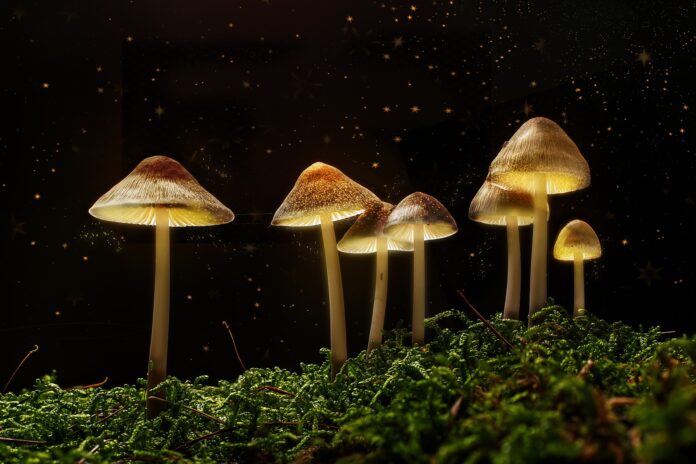Over the last two decades, there has been an increase in study on classic psychedelics — the pharmacological family of substances that includes psilocybin, a component of so-called magic mushrooms. The National Institute on Drug Abuse reports that psilocybin can cause perceptual alterations, affecting a person’s awareness of their environment as well as their thoughts and feelings. Psilocybin treatment has showed potential in research settings for treating a variety of mental health problems and addictions.
The researchers said that treating both groups with psilocybin led to big drops in depression, and that the severity of depression stayed low one, three, six, and 12 months after treatment. The GRID-Hamilton Depression Rating Scale, a standard tool for assessing depression, was used to measure depressive symptoms before and after treatment.
Psilocybin, sometimes known as magic mushrooms, is a naturally occurring substance that is ingested for its hallucinogenic properties.
Benefits of Psilocybin Therapy
According to studies,12 “psilocybin is claimed to result in considerable alterations in brain dynamics and functional connectivity (FC) between parts of the brain.” This may assist to explain why the outcomes of its use have been so spectacular, and why they have lasted longer than other types of treatment.
According to the many research pieces mentioned in this article, the advantages of psilocybin treatment include the following:
- A deeper spirituality and sense of belonging
- Lower rates of depression
- Chronic depression moving into remission
- Decreased levels of anxiety
- Improved mood
- Less fear of the future
How does psilocybin therapy work?
- The therapist and patient get to know each other and build a trusting relationship during these initial preparation sessions, so the patient feels supported and at peace throughout the psilocybin session.
- The patient lies down on a bed in a comfortable room designed specifically for the session. They are given a capsule containing psilocybin. Patients participate in the experience by donning an eye mask and listening to a personalized playlist of instrumental music that has been created specifically for them. The psilocybin high normally lasts 6-8 hours. Throughout the session, a therapist and an assistant therapist are present.
- Patients are encouraged to talk about their psilocybin sessions. The goal is for patients, with the help of their therapist, to generate their own insights and ideas from the experience in order to change unhelpful emotional and behavioral patterns.
Can Psilocybin help with depression?
It is apparent that psilocybin therapy has the ability to alleviate sadness and anxiety symptoms.
Depression and anxiety can both be serious, debilitating diseases that prevent individuals from going about their usual daily lives.
The findings of investigations have been no less dramatic for patients whose depression had previously been resistant to treatment. According to one study, 13 out of 20 patients improved, and four of them reported depressive remission. A meta-analysis of two dozen trials found that 65% of patients experienced less anxiety after psilocybin therapy treatment.
Can Mushrooms Cause Addiction?
Psilocybin, like other hallucinogens like LSD, is not considered addictive. They do not normally result in compulsive use or drug-seeking behavior, and users do not typically become physically dependent. When a heavy user stops using mushrooms, withdrawal symptoms are not known to occur.
Possible explanations for the lack of addiction with these medicines include the fact that, unlike stimulants and opioids, they do not activate pleasure centers in the brain. The effects can also be so severe, both psychologically and physically, that consumers limit their use.
People who consume mushrooms on a regular basis, on the other hand, may build a tolerance to them. This means that when someone takes similar doses of the medicine regularly over time, the subjective effects of the drug will lessen. Furthermore, regular mushroom users may develop tolerance to other hallucinogens that act on the same brain receptors as mushrooms, such as LSD and peyote. This tolerance, however, does not remain if the person abstains for numerous days.
Optimal Dose
However, as with other psychedelics, more research into the mechanism of action of this mind-altering medicine is required. More study is also required to understand how many dosages and concentrations patients should take to achieve the optimal results.
The use of MDMA and psilocybin is illegal in most of Europe (some exceptions are available, with restrictions, in the Netherlands and Austria). Proponents of psychedelics, on the other hand, are having a lot of success in the United States.
Magic mushrooms have been legal in some parts of the United States for mental health treatment in supervised settings since 2021, and a bill currently being considered in California would go some way toward legalizing the use of a psychedelic cocktail that contains magic mushrooms, MDMA, and LSD.
How to Begin
The availability of psilocybin therapy in your area is determined by where you reside as well as whether or not trials are being undertaken nearby. Your best chance is to look into the therapy in your area to see if there are any legal therapeutic uses for it and/or if there are any ongoing research studies that you may participate in.



